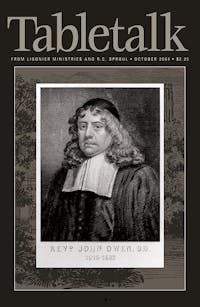
Request your free, three-month trial to Tabletalk magazine. You’ll receive the print issue monthly and gain immediate digital access to decades of archives. This trial is risk-free. No credit card required.
Try Tabletalk NowAlready receive Tabletalk magazine every month?
Verify your email address to gain unlimited access.
While a student in Bible college I was faced with a dilemma. According to a professor of mine, as a minister, I could either be a student of theology or a student of Scripture. It was his contention that ministers are called to be students of Scripture, not students of theology. I wrestled between the two options for many months. Would I be a faithful student of Scripture or would I be an articulate student of theology? I was convinced that in order to pursue theological study I would need to sacrifice my devotion to the study of Scripture, and that if I were to continue as a student of Scripture, I would need to forget about theology. It later occurred to me that there is another option.
Theology, properly speaking, is the study of God. As Christians, we are called to know God as He has revealed Himself to us. Therefore, in order to be students of theology, we must be students of His Word. On this point, Thomas Aquinas wrote: Theologia Deum docet, ab Deo docetur, et ad Deum ducit (theology teaches God, is taught by God, and leads to God).
Theology is not a philosophical pursuit of abstract speculations about God. It is in fact the examination of that which God has revealed to us. As faithful students of the Word of God, we are, by necessity, students of theology. The two are not at odds with each other; rather, they serve to complement one another. Whereas the Word of God is the foundation of our knowledge, theology is the expression of our knowledge. Thus, the study of God cannot be separated from the Word of God.
It is with this in mind that we look to John Owen who was, above all, a theologian of the Word. He is regarded as one of the church’s greatest systematic theologians. He expounded the depths of some of the most difficult doctrines of the faith, but in doing so he did not forsake the integrity of Scripture. On the contrary, his careful articulation of theology came as a result of his careful exegesis of the Word of God.
Owen did not revere himself as a master of Scripture but as a humble servant of it. His devotion to the Word of God was in direct correlation to his devotion to God Himself. Indeed, Owen was a man of God who served the church of God as a student of God’s Word. To him we owe great respect, for he lived coram Deo, before the face of God, as a burning and shining light to the world.
